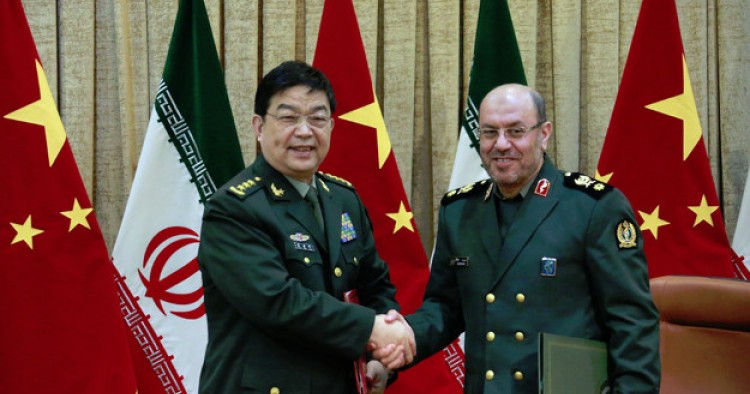The Iranian media reports that Iran and China signed an agreement on November 14 to bolster defense-military cooperation and fight terrorism.
“With extensive experiences gained from combating terrorism in recent years, the Islamic Republic of Iran expresses its readiness to create a collective movement to confront this threat and believe that China can play a very effective role in this regard,” Iranian Defense Minister Hossein Dehghan said in a meeting with his Chinese counterpart Chang Wanquan in Tehran. “Boosting long-term defense-military ties and cooperation with China is among the chief priorities of the Islamic Republic of Iran’s defense diplomacy,” he added.
In a separate meeting, Chief of Staff of the Iranian Armed Forces Mohammad Hossein Baqeri said the implementation of the agreement would elevate bilateral ties to a “strategic level” and expressed Iran’s readiness to hold joint military drills with China.
Military ties between Iran and China have improved since President Hassan Rouhani came into power in 2013 and Iran signed a nuclear agreement with world powers last year.
In May 2014, Dehghan visited Beijing and negotiated mutual visits and personnel training cooperation between the two countries; and in April 2015, the Iranian and Chinese defense ministers also held a meeting on the sidelines of an international security conference in Moscow.
Bilateral economic and trade relations have also seen an upswing lately.
On November 8, Iran signed a $4.8 billion gas deal with France’s Total and the China National Petroleum Corporation (CNPC). And per Iran’s custom administration officials, Iran’s non-oil exports to China has increased by 52 percent since 2013. Tehran-Beijing trade at present surpasses $40 billion a year and is expected to reach an accumulative amount of $600 billion over the next decade.
Iran also seeks to join the China-Pakistan Economic Corridor (CPEC), a development scheme aimed at linking the Chinese city of Kashgar to Pakistan’s Gwadar port. On November 12, Iran’s Ambassador to Pakistan Mehdi Bahonour penned an article in the Islamic Republic News Agency, detailing potential advantages of joining CPEC for Iran, and underlined that Iran’s vast energy reserves, expertise in engineering and construction, and geostrategic location would add tremendous value to the plan.
Monitoring hardline Iranian media also shows that while some conservatives and leaders of the Islamic Revolution Guards Corps (IRGC) oppose the Rouhani government’s diplomatic and economic outreach to the West, they are largely supportive of deepening ties between Iran and Asian powers such as China and Russia.
The Middle East Institute (MEI) is an independent, non-partisan, non-for-profit, educational organization. It does not engage in advocacy and its scholars’ opinions are their own. MEI welcomes financial donations, but retains sole editorial control over its work and its publications reflect only the authors’ views. For a listing of MEI donors, please click here.













